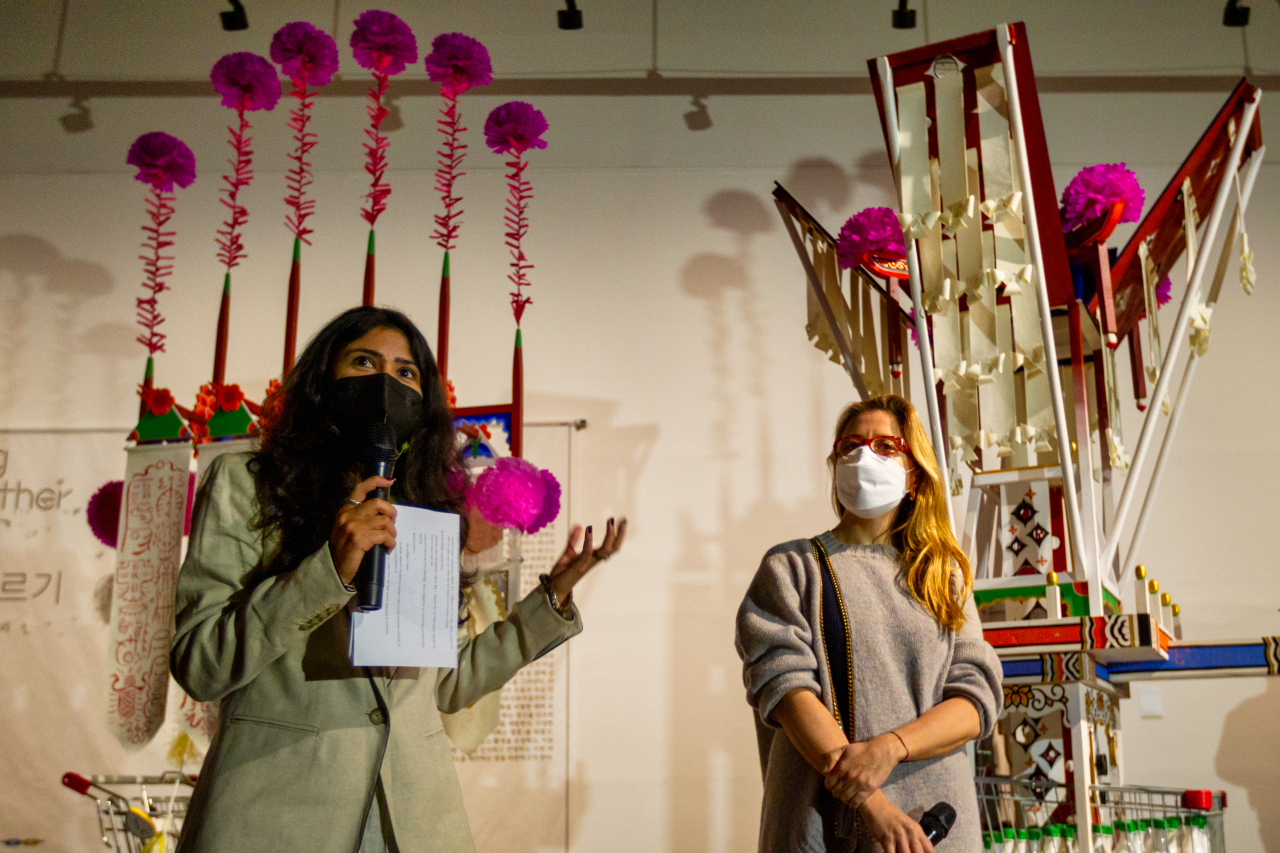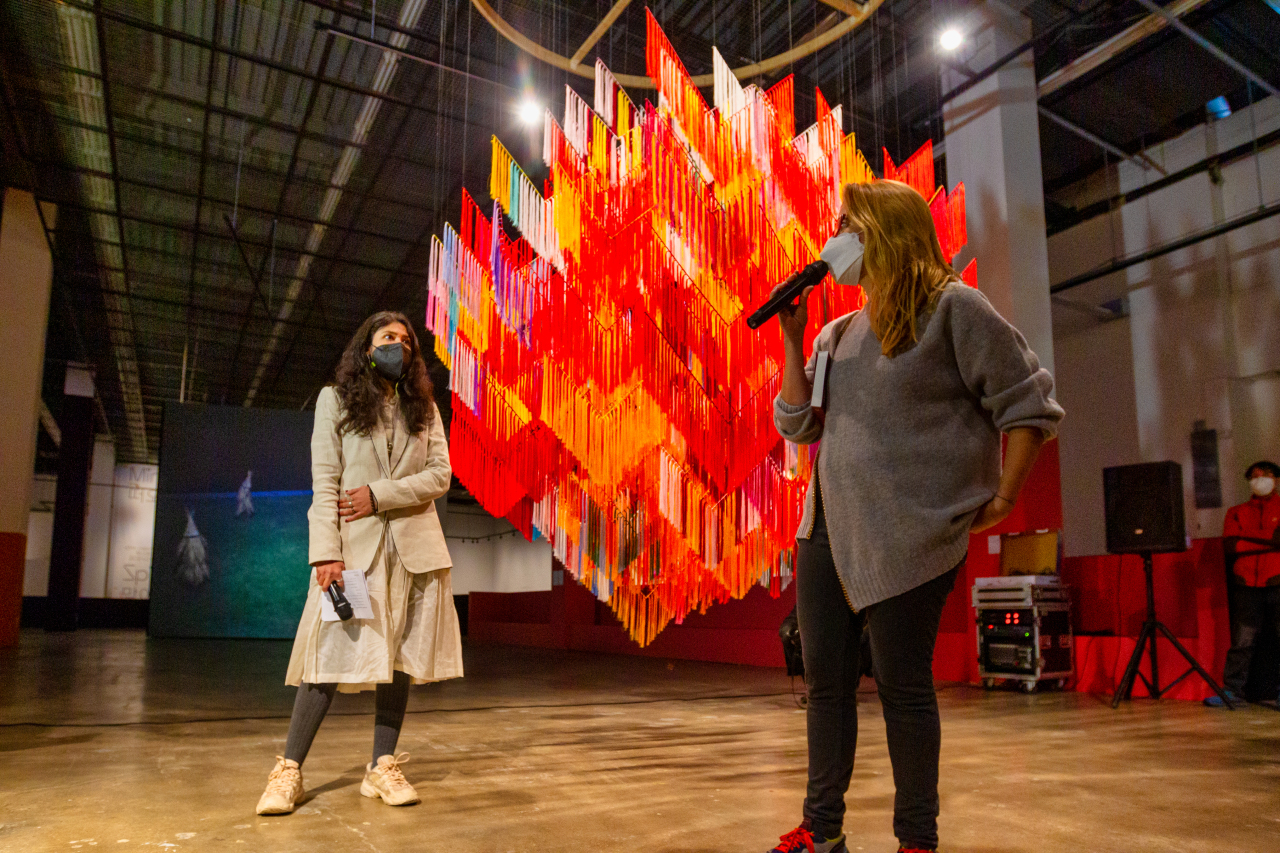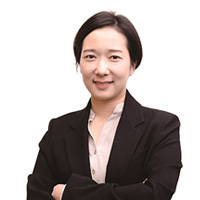Upcoming Gwangju Biennale gains relevance in pandemic times
By Park YunaPublished : Feb. 27, 2021 - 16:01

The 13th Gwangju Biennale -- South Korea’s largest art biennale, which has become a major art event in Asia -- was previewed Wednesday at the Biennale Hall with the unveiling of a few of its commissioned works.
Artistic directors Natasha Ginwala and Defne Ayas, based respectively in Sri Lanka and Germany, summarized the progress of the biennale ahead of its opening April 1.
As suggested by the theme of the 13th edition of the biennale -- “Minds Rising, Spirits Tuning” -- the exhibition hall gave off a unique vibe that made it easy to become immersed in the exhibition. Featuring 69 artists and 41 new commissions, the biennale will go ahead with no changes to the original plan for the theme or the commissions, the two directors said during the press conference.
“‘Minds Rising, Spirits Tuning’ looks at the extended mind and looks at dialectical space between organic and inorganic intelligence, between human intelligence that is hidden in the Indigenous culture and nonhuman forms of intelligence,” said Ayas. “Some of the topics we have been engaging with this part of our exhibition have become more relevant over the past few years (due to the pandemic).”
The exhibition will delve into a broad set of cosmologies, many forms of intelligence including machine intelligence and spiritual powers, planetary life systems and modes of communal survival as they contend with the future horizons of cognitive capitalism, algorithmic violence and planetary imperialism, according to the foundation.
“The mind is the program space. Mind is programmed through social practices, through ancestor practices, historical practices, but also machine practices that come from automation, come from technology. And we really feel that Korea brings these together,” said Ginwala. “With the world moving during the pandemic, technology -- but also our historical practices, ecologically sustainable practices -- are extremely important to think about together.”
Artistic directors Natasha Ginwala and Defne Ayas, based respectively in Sri Lanka and Germany, summarized the progress of the biennale ahead of its opening April 1.
As suggested by the theme of the 13th edition of the biennale -- “Minds Rising, Spirits Tuning” -- the exhibition hall gave off a unique vibe that made it easy to become immersed in the exhibition. Featuring 69 artists and 41 new commissions, the biennale will go ahead with no changes to the original plan for the theme or the commissions, the two directors said during the press conference.
“‘Minds Rising, Spirits Tuning’ looks at the extended mind and looks at dialectical space between organic and inorganic intelligence, between human intelligence that is hidden in the Indigenous culture and nonhuman forms of intelligence,” said Ayas. “Some of the topics we have been engaging with this part of our exhibition have become more relevant over the past few years (due to the pandemic).”
The exhibition will delve into a broad set of cosmologies, many forms of intelligence including machine intelligence and spiritual powers, planetary life systems and modes of communal survival as they contend with the future horizons of cognitive capitalism, algorithmic violence and planetary imperialism, according to the foundation.
“The mind is the program space. Mind is programmed through social practices, through ancestor practices, historical practices, but also machine practices that come from automation, come from technology. And we really feel that Korea brings these together,” said Ginwala. “With the world moving during the pandemic, technology -- but also our historical practices, ecologically sustainable practices -- are extremely important to think about together.”

The biennale was scheduled for Feb. 26 but postponed as the pandemic continued to ravage the country, and the exhibition period was scaled down to 39 days -- from April to May 9 -- from 73 days. It will take place across the city -- including the Biennale Hall, which holds five large-scale galleries, and the biennale’s major venues, the Gwangju National Museum, the Gwangju Theater and Horanggasy Artpolygon.
“A variety of performances, including those with ‘mudang’ (Korean shamans), were a big part of the biennale, which were scheduled to take place throughout the art event. We will show the performances to the audiences as we planned through the online platform, although we will not be able to show them in person due to the pandemic,” said Bella Jung, chief curator of the exhibition team.
“We needed to try. Korea is the last hope for a biennale of this scale to be held. In various parts of Europe, Asia and Africa, the pandemic levels are far more severe. Artists have sent their works from all over the world. They and our international collaborators are eagerly waiting for this biennale to open," said Ginwala.
The biennale foundation also released a book, “Stronger Than Bone,” which explores feminist issues and how to overcome communal trauma caused by violent dictatorships. The book was published in English by the Berlin-based publisher Archive Books.
By Park Yuna (yunapark@heraldcorp.com)
“A variety of performances, including those with ‘mudang’ (Korean shamans), were a big part of the biennale, which were scheduled to take place throughout the art event. We will show the performances to the audiences as we planned through the online platform, although we will not be able to show them in person due to the pandemic,” said Bella Jung, chief curator of the exhibition team.
“We needed to try. Korea is the last hope for a biennale of this scale to be held. In various parts of Europe, Asia and Africa, the pandemic levels are far more severe. Artists have sent their works from all over the world. They and our international collaborators are eagerly waiting for this biennale to open," said Ginwala.
The biennale foundation also released a book, “Stronger Than Bone,” which explores feminist issues and how to overcome communal trauma caused by violent dictatorships. The book was published in English by the Berlin-based publisher Archive Books.
By Park Yuna (yunapark@heraldcorp.com)










![[Hello India] Hyundai Motor vows to boost 'clean mobility' in India](http://res.heraldm.com/phpwas/restmb_idxmake.php?idx=644&simg=/content/image/2024/04/25/20240425050672_0.jpg&u=)









